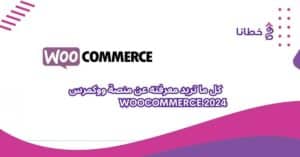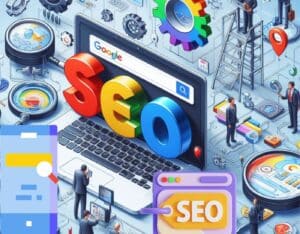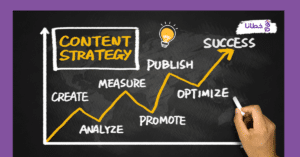table of contents
In today’s always-connected world, e-commerce has become a key growth driver for many businesses. If you’re looking to launch your online store or improve your online presence, here are five essential steps to building a successful online store and attracting your target customers.
E-commerce Marketing: 5 Steps to Building a Successful Online Store
1- Choosing the appropriate platform:
Choosing the right e-commerce platform for your business model is the right place to start. Popular options include Shopify, WooCommerce, and BigCommerce. Evaluate each platform’s features, costs, and features to suit your store’s needs best.
2- Design your store:
Your store’s design should be attractive and functional to enhance the user experience. Use professional, responsive designs that work on all devices. Also, make sure navigation, searching, and purchasing are easy.
3- Content management and marketing:
Creating unique and valuable content is the foundation of successful e-commerce marketing. Publish relevant content about your products and industry to attract more visitors. Use relevant keywords for search engine optimization.
4- Sales and Shipping Management:
Ensure easy and reliable purchasing and shipping. Offer multiple payment options and competitive shipping plans. Organize inventory and shipping operations to fulfill customer orders promptly.
5- Store analysis and improvement:
Continuously monitor your store’s performance and customer behavior. Use data and analytics to identify strengths and weaknesses and make appropriate improvements. This will help you improve conversions and sales.
Read more about: Analyzing user behavior on your website.
Key e-commerce marketing strategies
There are a number of key strategies for e-commerce marketing, namely:
1- Search Engine Optimization (SEO):
- Optimize website content and keywords to improve your site’s ranking in search results.
- Create valuable and relevant content to attract more visitors.
- Building internal and external links to improve site authority.
Also see: 10 tried and true strategies to help you improve your site’s search ranking.
2- Search Marketing (SEM):
- Use paid search engine advertising to target keyword searches.
- Effectively manage PPC (pay per click) campaigns to achieve maximum ROI.
See also: Developing search engine marketing strategies.
3- Email marketing:
- Create valuable content and targeted email campaigns to increase sales and engagement.
- Target current and potential customers via email.
- Building a targeted database of mailing list subscribers.
Read more about: Email Marketing.

4- Social media marketing:
- Build a strong presence on major social platforms.
- Create engaging and engaging brand content.
- Targeting the right audiences and activating engagement.
5- Content Marketing:
- Use content to attract more subscribers and customers.
- Distributing content across various digital channels.
- Create valuable and relevant content for your brand.
These integrated strategies help reach your target audience, drive sales, and engage with e-commerce.
E-marketing company
Khutana is one of the best digital marketing and SEO companies in the Arab world. Khutana Its well-thought-out and practical strategies can help you successfully achieve your marketing goals.
What is e-commerce marketing?
1- The concept of marketing for e-commerce:
E-commerce marketing is a set of strategies and techniques used to promote and sell products or services online. The goal is to attract more potential buyers to your online store and convert them into actual customers.
2- The importance of e-commerce marketing:
- Increase brand awareness and attract more visitors to the website.
- Increase social media presence and engagement.
- Collect valuable data about consumer behavior and preferences.
- Improve conversion rates and sales.
The most important marketing strategies for e-commerce:
- Social media marketing.
- Building a loyal and engaged customer base.
- Online advertising campaigns.
- Search Engine Optimization (SEO).
- Email marketing.
- Content marketing.
- Influencer marketing.
Successful e-commerce marketing depends on integrating these different strategies and focusing on engaging consumers and effectively meeting their needs. This helps build a strong brand and increase sales over the long term.
What is the difference between e-commerce and e-marketing?
Here is the main difference between e-commerce and e-marketing:
1- Definition:
- Digital marketing: strategies and techniques for using the Internet and digital media to promote products and services.
- E-commerce: The process of buying and selling goods and services over the Internet.
2- Scope:
- Online marketing is the part of the e-commerce process that focuses on attracting potential buyers.
- E-commerce includes the entire process of buying and selling online.
3- Objectives:
- Digital Marketing: The goal is to increase brand awareness and attract more customers.
- E-commerce: The main goal is to complete buying and selling transactions.
4- Activities:
- Digital marketing includes methods such as search marketing, email, social media, etc.
- E-commerce includes creating an online store, managing inventory, payment processing, delivery, etc.
In general, e-commerce is the process of buying and selling online, while e-marketing is the set of promotional and marketing strategies used to attract customers to an online store.
What are e-commerce tools?
There are a number of key tools used in e-commerce, the most important of which are:
1- E-commerce stores:
- Content management systems such as WooCommerce, Magento, Shopify.
- E-commerce platforms such as Amazon, eBay, Etsy.
2- Payment processing:
- Online payment gateways such as PayPal, Stripe, Square.
- Payment systems integrated with the online store.
3- Inventory and shipping management:
- Shipping and delivery services such as FedEx, UPS, USPS.
- Inventory and sales management systems.
4- E-marketing:
- Social media marketing platforms such as Facebook, Instagram, LinkedIn.
- Email marketing tools like MailChimp, Constant Contact.
5- Analysis and tracking:
- Website analytics tools such as Google Analytics.
- Conversion and sales tracking tools.
6- Information security:
- SSL certificates to secure online store transactions.
- Anti-hacking and anti-fraud software.
These are just examples of the essential tools for e-commerce. A combination of these tools and technologies is used to create and operate successful online stores.
What is the specialization of e-commerce marketing?
E-commerce marketing is a specialty that focuses on digital marketing strategies and practices to support and enhance the success and effectiveness of e-commerce. Some of the key areas within this specialty include:
1- E-marketing strategies:
- Managing digital marketing campaigns via search, email, Social media.
- Develop integrated e-marketing plans to increase reach and conversions.
2- Search Engine Optimization (SEO):
- Optimize website content to improve its ranking in search results.
- Create search engine optimization strategies.
3- Multi-channel e-commerce:
- Coordinating marketing and sales efforts across various online platforms.
- Analyzing consumer behavior and interaction across different channels.
4- E-commerce Analytics:
- Track and analyze sales and engagement data for continuous improvement.
- Using data to make data-driven marketing decisions.
5- User Experience and Conversions:
- Improving the design and shopping experience on websites.
- Test and improve conversion and sales processes.
This specialization combines marketing and digital skills to drive e-commerce growth. Practitioners in this field are involved in all aspects of digital marketing for online businesses.
What is the impact of e-commerce on marketing?
E-commerce has significantly impacted marketing strategies, and some of these key impacts can be summarized as follows:
1- Increased focus on digital marketing:
- Marketing is moving from traditional channels to digital channels such as websites and social media.
- Focus on SEO and digital content marketing.
2- Customizing marketing campaigns:
- Ability to analyze consumer data and customize campaigns based on that.
- Target consumers more accurately and effectively.
3- Increase response speed:
- Ability to launch marketing campaigns in rapid response to market events and trends.
- Ability to interact directly with consumers through digital channels.
4- Measuring the effectiveness of campaigns:
- Digital data provides the ability to more accurately measure and track the performance of marketing campaigns.
- Ability to optimize campaigns based on data analysis and results.
5- Developing long-term relationships:
- Increase interaction and engagement with consumers across digital channels.
- Build stronger relationships and maintain customer loyalty.
Overall, e-commerce has dramatically changed the way marketing strategies are developed and implemented, increasing their effectiveness and reach to targeted consumers. By following these five basic steps, you’ll be able to build a successful and engaging online store. Focusing on user experience and effective marketing will be key to your e-commerce success. Stay up-to-date on emerging trends and technologies to ensure your store remains competitive.
Questions about the article “E-commerce Marketing: 5 Steps to Building a Successful Online Store”
What is an e-commerce market?
E-commerce is the process of buying and selling goods and services electronically, usually over the Internet. Businesses can create their own e-commerce website, create an e-commerce storefront on a well-known retail site like Amazon, or do it all with a multi-channel approach.
How does e-commerce work?
E-commerce (which stands for “electronic commerce”) is the process of trading over the Internet. It includes all online activities involving the buying and selling of products and services. This exchange may occur between two businesses (B2B) or between businesses and consumers (B2C).
How to start selling on Amazon?
How do I start selling with Amazon? Start by choosing a selling plan, then register with Amazon and create an Amazon seller account. Once your account is set up, you can list and price your products, choose a fulfillment method, and explore promotion and advertising options.
What is the difference between e-business and e-commerce?
The terms e-commerce and electronic commerce can be used interchangeably. However, e-commerce refers to transactions conducted over the internet, while e-commerce encompasses all services and commercial activities conducted using the web.
We respect and value your time... half an hour to grow your project
































